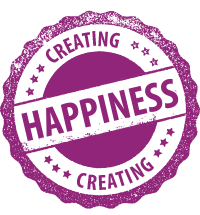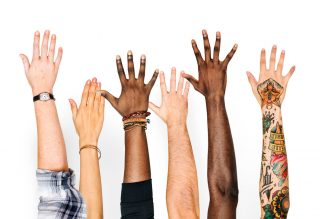There is no peaceful, joyous life without forgiveness. That is, forgiving myself and forgiving others. We all have hurt ourselves and others, and have been hurt by others. This is part of the human condition.
Hanging on to anger and resentment is like drinking a cup of poison, hoping the other person will die. Or, how a Chinese proverb puts it, “ If you are going to pursue revenge, dig two graves”, because your resentment has the power to destroy you.
At this point, I hear some of you say, “But, Daniela, I just don’t feel it. Even if I say, ‘I forgive’, it means nothing”. That’s ok. The journey of forgiveness starts with a decision to want to forgive, to choose to say those words out loud, although they feel like strangers. Over time, as you move ahead on the path of forgiveness, the emotions will follow.
I find that so empowering because that means that forgiveness is not up to my emotions, but it is always available to me – it’s only a choice away. This way, my inner peace does not depend on anybody else! What freedom.
Each time we experience hurt, harm or loss, we face the choice of whether to retaliate or forgive. When we seek retaliation or revenge, it gives us a short sense of relief, but soon after most of us realize that responding in kind, and continuing the cycle of violence, did not make us feel better after all. To deny forgiveness keeps us stuck in a toxic state of anger.
Depending on the offense, forgiveness is not easy. It requires hard work and constant willingness. It is not a one-time decision, but rather a journey. Forgiveness is not weakness, it requires strength and courage.
Forgiveness is not forgetting, it requires a fearless remembering of hurt and working through it. Forgiveness is not condoning hurtful actions and subverting justice. And, forgiveness is the only way for you to restore emotional freedom and joy to your life.
Are you fed up being stuck in anger and you want to see if it is possible for you to learn to let go? If yes, read on, here are some tips that can make the journey of forgiveness easier.
1. Stay in the present.
Your past history and all of your hurts are no longer in your physical reality. Don’t allow them to be here in your mind, ruining your present moments. You can learn to refuse to waste energy focusing on the past. This is precious energy you will miss right here and now, where your life is actually happening. Connect to the present moments as much as possible and stay there.
The easiest way for me to connect to the present, is to engage all my five senses by asking myself, “What am I seeing right now?”, “What am I tasting right now?”, “What am I hearing right now?”, “What am I smelling right now?”, and, “What am I touching right now?”
After having connected with my senses, in order to deepen my mindful state, I like to say out loud (or internally if others are present), “I am here, and this is a precious moment, I want to live and enjoy it fully”. Try it! This might work for you too.
And, when your mind wants to go back to the past offense, remind your brain, “Right now I am here, and without any thoughts of the past attached to this moment, I am good and can enjoy it fully”.
2. Ask yourself, “Have I done the same”?
If you are a bit like me, it is easy for me to see how others have hurt and offended me in the past. But many times when I chose to be honest with myself, I had to admit that I had done the same to others.
For example, I hate it when people slam the door right in my face. But, I have done the same when tired or simply thoughtless. I hate it when a person is rude. But, I have been rude to others, especially when not feeling good myself.
To keep in mind my own offenses makes it easier to forgive when others do the same thing me, remembering that we are all just human.
3. Try to understand the full history of the person who has hurt you.
To inflict pain is always an expression of internal pain that a person is experiencing. As a rule, a person who feels good about themselves and their life is kind and loving. Like Marianne Williamson said in her book A Return To Love, an action of a person is either “an expression of love, or a cry for help [because they are hurting]”.
When trying to forgive, it can be helpful to understand why the person that has hurt you is in so much pain that it is spilling over into your life. To understand the pain history of a person that has hurt you, can make it easier to extend compassion and forgiveness towards them.
4. Check out your stories.
When we feel hurt, our brain’s job is to make sense of the situation and come up with an explanation (aka a story). Remember, a story is just a story until it is confirmed.
For example, if your brain comes up with the story, “She looked at me and then turned away, which means she disrespects me”, that could be true or not. The only way to find out would be to talk to that person. I suggest you take the stories your brain comes up with, with a grain of salt.
My rule is, if I can let an action that hurt me go without holding resentment, then I will. However, if that is not the case, I need to find the courage to have a talk with that person and check out if my story is right.
My experience has taught me that, more often than not, my stories have been wrong, and those conversations (although very scary to initiate for me) have been such an important tool to let go of resentment.
5. Refuse to be offended.
It is easy to find opportunities to be offended. It can be a rude stranger, being cut off when driving, someone cursing, a sneeze, a look, just about anything will do if you are looking for an occasion to be offended. In order to have a more peaceful life, you can choose to refuse to be offended, to let things go and take nothing personally.
How people treat you and respond to you, has most of the time very little – if not nothing – to do with you. Each time a person treats you disrespectfully, they reveal to you that they are not in a good place. They might be in a rush, stressed, sick, heartbroken, lonely, craving coffee, or simply distracted. Remembering that, might make it easier to extend compassion and let the offense go.
How my teacher and colleague, Dr. Sophie Slade, used to say frequently during my Imago Relationship Therapy training, “How people treat you has 90% to do with them, and 10% with you”.
6. Assume good intent.
When you feel hurt by someone, assume good intent first.
Don’t allow your brain to automatically go to a blame story like, “I know that he did this on purpose, he can’t stand me”. Instead, slow down and choose to assume good intent first. If you want to address that you are hurt, you could say something like, “I assume you are coming from a good place, I just want to let you know that this did not feel good”. This will make resolving conflict and forgiving easier.
7. See it as a growth opportunity.
Whenever you’re upset over the conduct of others, see if you can reframe it as a growth opportunity and ask yourself how this situation can help you to grow.
For example, a situation where you feel offended, might invite you to learn to get better at having difficult conversations, it might invite you to strengthen your skill of not sweating the small stuff, it might invite you to learn to set better boundaries, practice better self-care, or to let go of a toxic relationship.
Taking the focus off of the offending party and putting it on how this situation can serve you to grow, moves you from a victim stance to a stance of empowerment.
Some of us will experience grave violations and deep, gut-wrenching loss in our lifetime. If that is the case for you, you most likely will profit from professional help. If you feel overwhelmed by the thought of forgiveness, have no clue where to start or simply feel this will be never possible in your case, please reach out to a therapist who will accompany you on that journey.
A great resource if you want to explore forgiveness on a deeper level, is The Book of Forgiveness: The Fourfold Path for Healing Ourselves and Our World by Desmond Tutu and his daughter Mpho Tutu.
It is an inspiring book that offers concrete steps and exercises, leading you towards being able to let go of the offense that keeps you hostage.
References:
A Return To Love by Marianne Williamson (1992)The Book of Forgiveness: The Fourfold Path for Healing Ourselves and Our World by Desmond Tutu & Mpho Tutu (2014)

This post is part of the blog series "Creating Happiness", your inspiration to promote positive change in your life.
Do you like Daniela's posts? Subscribe to her blog series:
ABOUT THE AUTHOR
Ms Daniela Beer-Becker, Psychologist
Daniela is a regular contributor to the Blake Psychology blog and author of the "Creating Happiness" series.
MORE POSTS IN THE SERIES
















